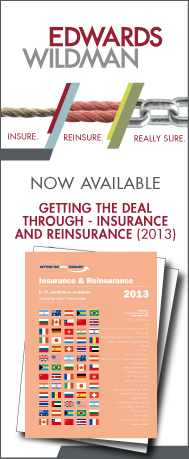 |
|
| edwardswildman.com | |
English Court Decides for the First Time Issues Concerning the Construction of the Bermuda Form Actual legal liabilityby Nathan Hull ,
Rhys Davies In a first for the English courts, the Commercial Court has decided a case concerning the construction of the Bermuda Form under English law: AstraZeneca Insurance Company Ltd v XL Insurance (Bermuda) Ltd [2013] EWHC 349 (Comm). Usually excess liability insurance underwritten on the Bermuda Form is expressly governed by a modified form of New York law and disputes are determined by arbitration in London. However, in AstraZeneca, the insurance was subject to English law and the dispute was before the Commercial Court. The case reiterates the principle of English law that liability is only established for the purposes of an insurance policy where the insured is under actual legal liability to a third party claimant (unless otherwise agreed). It was found that this principle applied to the Bermuda Form, governed by English law. Facts AstraZeneca (AZ) manufactured, marketed, and sold in the United States and Canada an antipsychotic drug, and faced losses (mainly defence costs) arising out of claims for personal injury caused by the drug. AZ was insured for these losses under an insurance policy issued to it by AstraZeneca Insurance Co. Limited, AZ’s captive insurer (the Captive). The insurance was on the terms of the Bermuda Form (XL004 Form). The Captive was reinsured by XL and ACE (the Reinsurers), and it is understood that the reinsurance was also on the terms of the Bermuda Form without the equivalent of a “follow the settlement” provision. The Bermuda Form is an “occurrence first reported” policy, fixing “Occurrences” and an “Integrated Occurrence” to the policy year in which notice is first given. The Form is ordinarily subject to a modified form of New York law and to English arbitration. However, in this case, the parties to the insurance contract, the Captive and AZ, had agreed that it would be governed by English law. Further, the Captive and the Reinsurers agreed, in the current dispute, to waive the requirement that the parties arbitrate, and conferred jurisdiction on the English Court. Although the present dispute was between the Captive and the Reinsurers, it was the policy issued by the Captive to AZ which was in issue. The Commercial Court (Mr Justice Flaux) was asked to decide two preliminary issues in relation to that policy:
Decision As regards the first preliminary issue, Flaux J noted that under New York law, where there was a duty to defend, provided the insurer had notice of the underlying claim and a reasonable, bona fide settlement was reached, that would suffice for the purposes of establishing liability under the policy. However, the judge was quick to reach the conclusion that New York law played no part in the construction of the Bermuda Form policy in question, notwithstanding the submissions of the Captive to the contrary. The parties had deliberately chosen to amend the insurance policy, by endorsement, to provide for English law. New York law did not apply. The judge found that the English authorities consistently support the general proposition in the leading textbook, MacGillivray on Insurance Law (12th edition) at [29-006]: Further, the judge held that the English authorities establish, consistently, that the insured under a liability insurance policy will need to establish actual legal liability to a third party before it can recover from the insurer, unless the particular language used in the policy clearly provides to the contrary. To succeed, the Captive would need to displace that general principle of English law. Rejecting the submissions of the Captive and finding for the Reinsurers on the first preliminary issue, the judge held that it was clear that the indemnity provided by the insurance policy is in respect of what the insured “pays by reason of liability … imposed by law”. The judge held that the words “by reason of” indicated that there has to be a clear causal link between what is paid and liability, and the words “imposed by law” made it clear that there has to be “actual legal liability”. The judge also endorsed the view of Mr Justice Aikens in Enterprise Oil v Strand Insurance [2007] Lloyd's Rep IR 186 that an insured can only be obligated to pay sums by law if there is an actual liability to do so; one cannot be obligated by law to pay sums if there is only an alleged liability. In addition, the judge held that there is a distinction between using a judgment or a settlement to establish loss, and using a judgment or a settlement to establish legal liability. A judgment may establish a loss, but may not necessarily establish the legal liability. In discussing the principles of English law concerning actual legal liability, the judge expressed the view that foreign judgments may not be determinative of liability under an insurance policy even if obtained in compliance with the four principles laid down in Commercial Union Assurance Co Plc v NRG Victory Reinsurance Limited [1998] CLC 920. In that case, the Court of Appeal stated that a judgment from a foreign court would be "decisive and binding" as to the liability of a reinsured, if the judgment was obtained in compliance with certain criteria. However, the judge noted that this approach had attracted criticism and stated that the “better view” was that, in the absence of any agreement, it will be open to a liability insurer to challenge findings of liability in an underlying judgment in proceedings to which it was not party in order to question whether in fact the insured is under a liability. As to the second preliminary issue, the judge noted that defence costs would only be recoverable if they fell within the insuring clause. This was problematic as the policy provided coverage insofar as the defence costs were Ultimate Net Loss paid by reason of liability imposed by law on account of Personal Injury. It was difficult to see how defence costs could be “imposed by law”. To give effect to the Captive’s submissions and construe the insurance policy to provide free standing cover for defence costs would involve re-writing the policy, and was not permissible. The judge noted that no claim to rectify the contract had been made. Adopting a concession made by the Reinsurers, Flaux J held that in including the words “and shall include Defence Costs” in the definition of “Damages” the parties had intended that defence costs were recoverable only in circumstances where “traditional” damages were recoverable. Therefore, defence costs could only be recoverable where actual legal liability is established for the damages to which the defence costs relate. Comment As a matter of English law, this case reiterates what is required to prove liability under an insurance policy in the absence of follow the settlements wording in the reinsurance policy. It remains the case that the reinsured must establish an actual legal liability under the policy reinsured to prove that it was liable under that policy. Notwithstanding this, Flaux J may have caused some controversy in his criticism of the four principles laid down in Commercial Union v NRG concerning foreign judgments. The judge has stated that, notwithstanding that these principles are met, the reinsurer will still be entitled to go behind a foreign judgment and challenge whether the reinsured was in fact under an actual legal liability to its insured. However, foreign judgments, particularly those obtained in accordance with the Commercial Union v NRG criteria, will still be good evidence of actual legal liability. As regards the Bermuda Form, it is at least clear insofar as the Form is subject to English law, that the insured will have to prove an actual legal liability in order to trigger cover under the policy. It may have been the case that, if the policy in this case was subject to the usual modified form of New York law, rather than English law, there would have been a different outcome. However, the judge did indicate that even if that had been the case, the default position under New York law (that a reasonable, bona fide settlement would suffice for the purpose of establishing liability under the policy) may not apply if the insurer is under no obligation to defend the insured (which is the case under the Bermuda Form). Whether that is in fact the case remains to be seen. Permission to appeal Flaux J’s decision to the Court of Appeal has been granted. Contact
| |
 |
|



